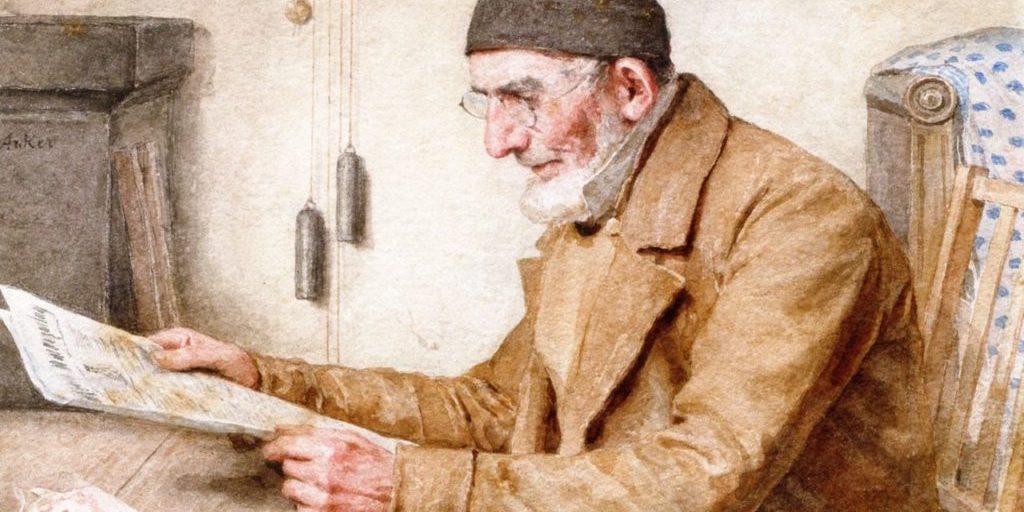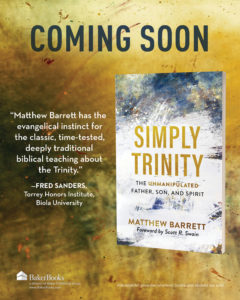
A Christian Case for the Importance of History
Americans are a present-minded people. In his wonderful new book Breaking Bread with the Dead, Alan Jacobs estimates that 98 percent of us “are wholly creatures of this particular intersection in space-time, and can’t be made to care about anything else.” I suspect the actual percentage is higher.
 I’ve spent the last third of a century trying to convince twenty-year-old college students why they should care deeply about the past. Here I’d like to narrow my focus and make a case for why American evangelicals, specifically, should forsake our present-minded ways and devote ourselves to faithful remembering.
I’ve spent the last third of a century trying to convince twenty-year-old college students why they should care deeply about the past. Here I’d like to narrow my focus and make a case for why American evangelicals, specifically, should forsake our present-minded ways and devote ourselves to faithful remembering.
History and Ontology
It starts with the realization that, by design, God has made us to be historical creatures. Timelessness may be an attribute of eternity, but for now we all live in time. Take away our memory and we lose not only our identity, but our very ability to function. This is because we perpetually draw on knowledge of the past to make sense of the present. We have, quite literally, no alternative. In this sense we are all inescapably historians, and when we pay serious attention to the past, we are leaning into one of the defining characteristics of our humanity.
We are all inescapably historians, and when we pay serious attention to the past, we are leaning into one of the defining characteristics of our humanity. Share on X But history is even more integral to the identity of the Christ follower. We claim to stake our lives on a faith that, at its heart, is “a vigorous appeal to history,” to quote the late Georges Florovsky. The core tenets of our faith rest on theological interpretations of historical events, notably Christ’s incarnation, crucifixion, and resurrection. As Margaret Bendroth puts it, the past tense is “essential to our language of faith.”
What is more, we claim to believe that God has grafted us into a historical Church that transcends the chasm of time, a “communion of saints” living and dead. In practice, this is much harder for us to wrap our minds around, especially to the degree that, as evangelicals, we have been conditioned to be suspicious of tradition and dismissive of most of church history. Add in the probability—significant and growing—that we worship in non-denominational congregations with limited histories of their own, and the predictable result is that we find it hard to think of ourselves as part of a story that began long before we arrived on the scene. In sum, our too-often impoverished conception of the Church—our gruel-thin ecclesiology—is inseparable from our present-minded “historylessness.”
History and Cultural Formation
Knowledge of the past is also essential for faithful discipleship. In his letter to the church at Rome, Paul warns us not to “conform to the pattern of this world” (Romans 12:2). In his second letter to the church at Corinth, he exhorts us to “take captive every thought to make it obedient to Christ” (2 Corinthians 10:5). These commandments are always daunting, but we make them immeasurably more difficult when we cut ourselves off from the past.
One of life’s great paradoxes is that we’re often oblivious to the cultural values that shape us the most. We don’t have to worry about the values that are currently contested—the kind that we blame on our political enemies and associate with the impending collapse of civilization. Rather, the challenge lies in those areas where we agree with our rivals. Over time, the values in this category come to seem “natural,” and what we see as natural we eventually cease to see at all. Our too-often impoverished conception of the Church—our gruel-thin ecclesiology—is inseparable from our present-minded “historylessness.” Share on X
The same goes for any value that has been constant during our lifetimes. My students, for instance, find it difficult to think critically about the way that digital devices are shaping us because they’ve never known a world without them. Similarly, almost all of us who were born in this country will be blind to the radical individualism that permeates American culture, precisely because it is so ubiquitous. It was already pervasive when Alexis de Tocqueville visited the United States nearly two centuries ago, and without the “memory before birth” that historical knowledge affords, we’re unlikely to take note of it, much less to think Christianly about it.
This is dangerous. When we’re “stranded in the present”—to borrow a phrase from Peter Fritzsche—the beliefs of the moment can look like timeless truths. The frightening result is that we can be shaped by our contemporary contexts without even realizing it. Nor can we “take captive every thought” when our present-mindedness renders our most deeply ingrained ways of thinking invisible to us. One of the great benefits of history is its potential to remind us that the way things are now is not the way they’ve always been. In the process, the aspects of our world view that we take for granted can come into focus. In this sense, an awareness of history can serve as a mirror, enabling us to see ourselves more clearly. Cut off from the past, we cannot understand ourselves by ourselves.
History and Ministry
Finally, historical knowledge can be vital to our ministry to a fallen world. Evangelical interest in history—especially U. S. history—has too often been motivated by culture-war concerns. We pay attention to the past in order to win debates against perceived enemies, with the result that we turn history into an arsenal, a storehouse not of wisdom and understanding but of weapons and ammunition—quotes and anecdotes that we draw like revolvers in a shoot-out with secular opponents.
An awareness of history can serve as a mirror, enabling us to see ourselves more clearly. Cut off from the past, we cannot understand ourselves by ourselves. Share on X But what if we were propelled less by fear than by love? Rightly pursued, history not only enables us to understand ourselves more rightly; it is essential if we are to understand our neighbors. Acknowledging their pasts, listening attentively to their stories, is integral to loving them. N. T. Wright has recently exhorted Christians to be “people of prayer at the place where the world is in pain.” The places where the world is in pain should also shape the questions that we ask of the past.
To cite only one example, as I write this, the United States is experiencing its greatest racial turmoil in a half century. If we truly long for racial reconciliation in our land—not to mention among our brothers and sisters in Christ—then surely one essential step will involve coming to grips honestly with America’s racial past. This won’t mean mindlessly following the New York Times and its 1619 project, but neither will it mean reflexively dismissing attention to the history of slavery and segregation as just one more example of political correctness or “cultural Marxism.” It will require instead that we set aside our political agendas and listen attentively to our neighbors with open minds and loving hearts. We might call such a spiritual discipline “righteous remembering.” It is all too rare in our fallen world, but the law of love requires it.

